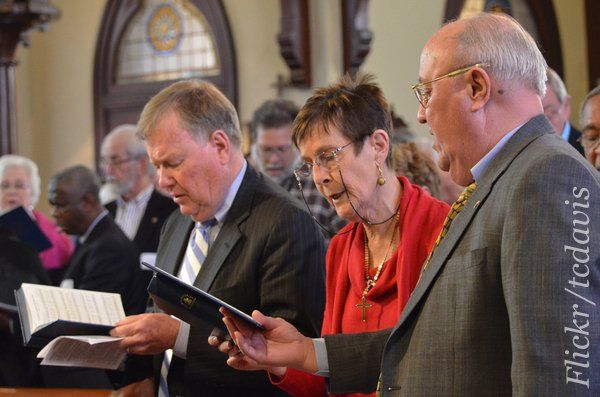
There is a phrase which was imported from America a couple of years ago: ‘dumbing down’ (from the German word for stupid, dumm). It is used of previously serious institutions which lower their standards in order to increase their appeal. Newspapers are accused of doing it, so are universities, the BBC and churches.
Constructing the news
In his recent autobiography the veteran newscaster Walter Cronkite laments the presidential candidates who were once given an average 42.3 seconds to make their point on nightly news, but who now get a maximum eight-second bite. The BBC has been looking at its news coverage and has come to the conclusion that it is too lofty and middle class. Listener research and ‘focus groups’ aimed at the young will tease out their opinions. A BBC spokesman said, ‘We want to take a closer look at our audiences and get a better understanding of them and of what they want.’ No doubt some being questioned will respond that much of the BBC is too serious and occasionally too difficult to follow. Radio listeners already have dozens of outlets and hundreds of commercial channels providing for those who want their news coverage to be down market.
The journalist Stephen Glover makes some pertinent observations about the qualifications for a newscaster, which have fascinating overtones for the preacher of God’s good news (Daily Telegraph, 7 February 1997).
1. The hearers should feel that the person presenting the news is motivated by a desire to tell the truth about an event that matters.
2. The news should not – if it is to be taken seriously – be delivered in the breathless tones of a sprinting newscaster. News must be delivered in a measured and authoritative way that signals its importance.
3. Such broadcasters are almost bound to be middle aged and middle class, since that is where authority lies. It is also where most people, whatever their socio-economic class, will look for it. Of course, there will be those who prefer the superficialities of the trendy youngster, but even they may be comforted by the knowledge that a different sort of news exists elsewhere.

4. The young are not always young. They grow older and take an interest in things that perhaps did not interest them much before. There is no point in presenting news in a way calculated to appeal to bored ‘youf’ if, in a few years, they find such a presentation superficial and lacking in authority.
5. The young are more interested in serious news about the state of the world than they are given credit for.
The worship
When Lord Runcie, a liberal sacramentalist, complains about the dumbing down of some modern worship services one’s gut reaction is to look with unusual sympathy at them. However, he does make three valid observations.
1. Altering the worship of God to make it fashionable, like some ecclesiastical version of a health farm, all in order to get people into church, is dangerous. We are being mesmerized by numbers.
2. Clappy-and-happy, huggy-and-feely worship can reduce God to a puppet to be manipulated according to people’s fantasies and desires. Some are worshipping a candy-floss idol.
3. Some contemporary forms of worship are inadequate in lifting people to a more serious attitude to life. They are fostering an irrational and self-centred spirituality.
While we judge those observations to be true they are ruined by Dr Runcie’s confession, ‘I am temperamentally against those forms of worship.’ If it is all a matter of temperament then we may as well throw in the towel now. Anything goes if it is your temperament that is the ultimate arbitrator. Runcie is basically an elitist speaking up for the beautiful lie of the high culture – which always judges evangelicalism to be vulgar. If the living God is sovereign and infinitely holy, then that itself determines how he is to be approached. In regeneration he will change our temperaments that we might bring a living sacrifice to him in his way.
Dumbing down the hymns

Everyone concedes that both the new worship songs and the manner in which they are sung are a radical break from the non-conformist heritage of hymnody which made them a part of our church life for 200 years. There is no doubt that older hymns are not only more solemn but also more severe than those which have replaced them. One of Isaac Watts’ hymns illustrates the point:
Show pity, Lord: O Lord forgive
Let a repenting rebel live!
Are not thy mercies large and free?
May not a sinner trust in Thee.
Such hymns repeatedly remind us of God’s authority and judgement, of our own unworthiness, and that our only hope lies in the pity of the Divine Sovereign. It is inherently painful for an unregenerate young person to sing such sentiments to tunes that enhance those words. They can only consent to such affections when they have experienced the Holy Spirit convicting of sin and pointing them to the Lamb of God. Until then all true worship is alien, and they will avoid it unless there are some external pressures. The language, music and rituals they live by are very different. Theirs is a world of soundbites and quick fixes in which images of violence and sex play an inordinate part. They live in a state of deep frustration, the origin of which can only be revealed to them in the Christian message. The temptation is to construct a form of worship from the debris of popular culture; to give the young a religion by making a religion of what they already have.

Professor Roger Scruton writes, ‘In the National Gallery hangs the painting which captures this predicament, Poussin’s sublime depiction of the Adoration of the Golden Calf. The Israelites are dancing around the idol in poses of abandon. The priest has persuaded them that the instincts enshrined in their popular culture are sufficient to redeem them; that this lustful dancing in a happy crowd is the essence of religion, which makes no higher demand. And their faces shine with relief: the relief of those who have escaped from judgement. The austere God of Moses has been brushed aside, and a playground affection has grown in place of his harsh commandments. In the distance, is the figure of Moses descending from the Sinai. He dashes down the tables of the law, appalled that the God who prescribed them – the eternal judge of human conduct – has become incomprehensible to his people’ (Times, 15 February 1997).
What does idolatry do? ‘Idolatry places what is merely human upon an altar. It therefore automatically diminishes the object of worship and reinforces the deep-down sentiment that there is nothing higher than the human, and nothing that stands in judgement over us. Idolatry therefore leads us to delinquency – and that, in a nutshell, is the condition in which we find ourselves. If the churches are to restore faith and hope to the young, they must find the means not only of attracting young people to church, but of making them uncomfortable when they get there’ (ibid.).
In some evangelical churches there is almost warfare going on between the pulpit and the pew. The latter have brought unacceptable pressures to bear upon biblical preaching by insisting on the introduction of unhelpful music. The preacher, instead of building on the foundation of the praise of scriptural affirmation, doxology and confession, has to begin his sermons by re-establishing from scratch a God-glorifying spiritual atmosphere. He has to dig his congregation out of the values of popular egalitarian culture, rotten with an esteem for man’s abilities, which dominates the first part of the service. So the strife between the church and the world has been introduced into the assembly of God.
We are not insisting on old hymns. We do not believe that all old hymns are good and that all new ones are bad. Nostalgia and antiquarianism have no place in the church of the living God.
Does it matter what kind of songs are sung in the first part of the service, people may ask, as long as the Word is preached? Christianity is indeed the religion of the Word, but it is not a religion of words, or talk. It is about the power of God-likeness. Worship is not a matter simply of instilling proper knowledge into people’s heads. If it were, then one would go to church to hear sermons, and nothing else in the service would matter much, being a mere decorative setting for the sermon. If that were the case, the members of the congregation might just as well stay at home and listen to a sermon on a cassette player. If listening to inspiring sermons were the only point, this would finish off church attendance. God’s true servants have preached a great Lord with a fitting reverence, godly fear and winsome love for 2000 years, and especially so at some favoured times. It is this reverence and godly fear which must be experienced throughout the whole service in the intercession, choice of hymns and the very spirit of holy affection evident among the worshipping people of God.










